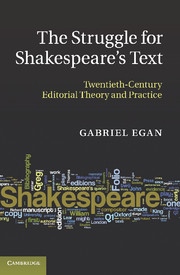Book contents
- Frontmatter
- Contents
- Preface
- Acknowledgements
- A note on references, quotations, names and pronouns
- Introduction
- 1 The fall of pessimism and the rise of New Bibliography, 1902–1942
- 2 New techniques and the Virginian School: New Bibliography 1939–1968
- 3 New Bibliography 1969–1979
- Intermezzo: the rise and fall of the theory of memorial reconstruction
- 4 New Bibliography critiqued and revised, 1980–1990
- 5 The ‘new’ New Bibliography: the Oxford Complete Works, 1978–1989
- 6 Materialism, unediting and version-editing, 1990–1999
- Conclusion: the twenty-first century
- Appendix 1 How early modern books were made: a brief guide
- Appendix 2 Table of Shakespeare editions up to 1623
- Appendix 3 Editorial principles of the major twentieth-century Shakespeare editions
- Works cited
- Index
5 - The ‘new’ New Bibliography: the Oxford Complete Works, 1978–1989
Published online by Cambridge University Press: 06 December 2010
- Frontmatter
- Contents
- Preface
- Acknowledgements
- A note on references, quotations, names and pronouns
- Introduction
- 1 The fall of pessimism and the rise of New Bibliography, 1902–1942
- 2 New techniques and the Virginian School: New Bibliography 1939–1968
- 3 New Bibliography 1969–1979
- Intermezzo: the rise and fall of the theory of memorial reconstruction
- 4 New Bibliography critiqued and revised, 1980–1990
- 5 The ‘new’ New Bibliography: the Oxford Complete Works, 1978–1989
- 6 Materialism, unediting and version-editing, 1990–1999
- Conclusion: the twenty-first century
- Appendix 1 How early modern books were made: a brief guide
- Appendix 2 Table of Shakespeare editions up to 1623
- Appendix 3 Editorial principles of the major twentieth-century Shakespeare editions
- Works cited
- Index
Summary
After nearly half a century of glacial progress on an edition of the complete works of Shakespeare, by 1978 all Oxford University Press had to show was R. B. McKerrow's Prolegomena (pp. 30–7 above), a few proof pages (Wells 1984, v) and the spin-off research by Alice Walker. In January of that year the Press appointed Stanley Wells to start the project afresh with a series of single-play volumes edited by different editors under Wells's general editorship and a complete works edition (Murphy 2003, 221–9). Guidelines for editors of the series of single-play volumes, known as the Oxford Shakespeare, were ready by the end of 1978 and do not embody the ‘new’ New Bibliography that was developed for the Oxford Complete Works discussed here (Wells 1991a). Wells had served first as associate editor under T. J. B. Spencer, and later as general editor, for the New Penguin Shakespeare since the 1960s (Wells 2006, 39–45), and was steeped in the new stage-centred approach fostered by the Shakespeare Institute in Stratford-upon-Avon, where for his Ph.D. he edited two of Robert Greene's prose narratives in 1961. The Institute was founded in 1951 by Allardyce Nicoll to build a scholarly relationship with the Shakespeare Memorial Theatre (now the Royal Shakespeare Company), and Nicoll chose as his first three fellows E. A. J. Honigmann, R. A. Foakes and John Russell Brown.
- Type
- Chapter
- Information
- The Struggle for Shakespeare's TextTwentieth-Century Editorial Theory and Practice, pp. 167 - 189Publisher: Cambridge University PressPrint publication year: 2010



